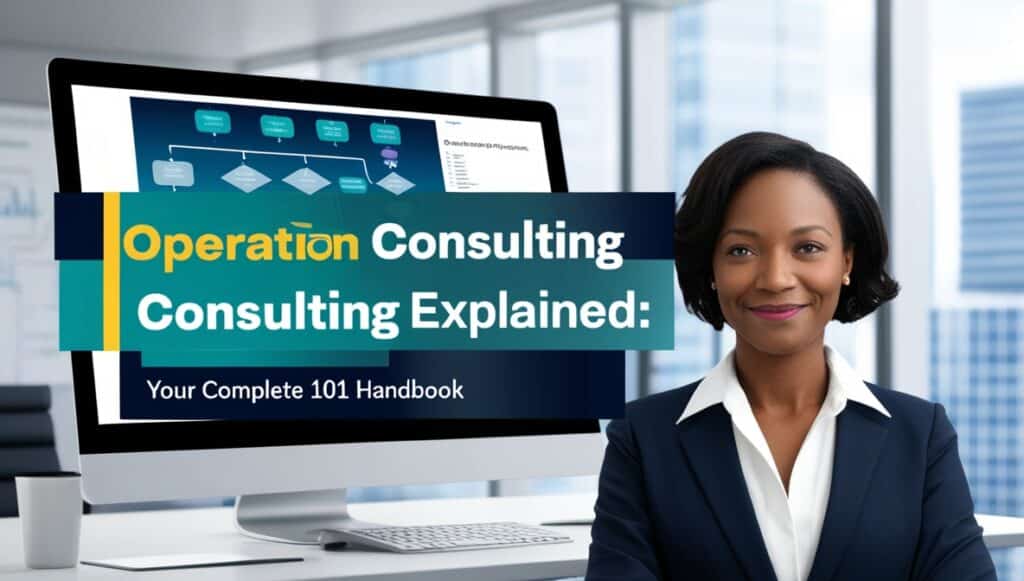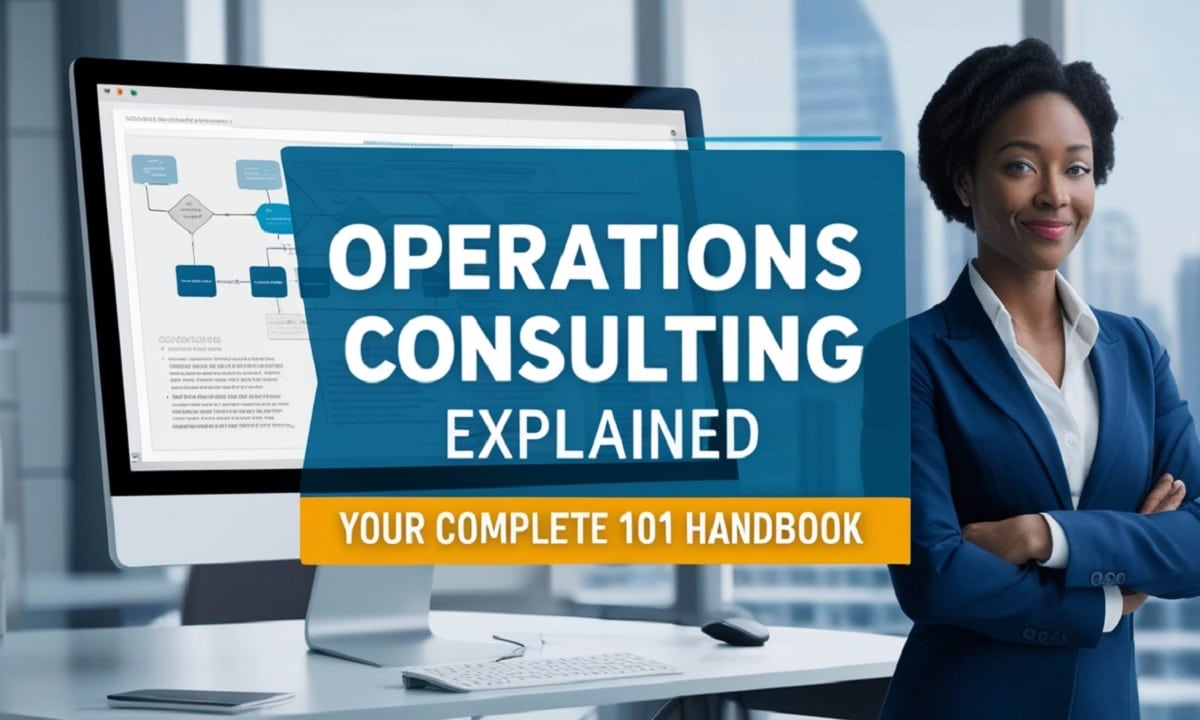Operations consulting has become the secret weapon behind countless business success stories. From saving Netflix $1 billion annually through smart content delivery optimization to helping Amazon perfect their logistics empire, operational efficiency drives real results.
This comprehensive guide breaks down everything you need to know about operations consulting. You’ll discover what consultants actually do, which firms dominate the market, and how to build a career in this dynamic field.
What Operations Consulting Really Means
Operations consulting focuses on making businesses run better, faster, and cheaper. Unlike other management consulting areas, operations consultants dive deep into the nuts and bolts of how work gets done. These professionals analyze workflows, eliminate waste, and design systems that boost organizational efficiency.

They’re the people who figure out why your factory line stops every Tuesday or why customers abandon shopping carts at checkout.
Business process optimization sits at the heart of operations consulting. Consultants don’t just identify problems – they build solutions that stick around after they leave. Real-world impact speaks volumes. When Starbucks redesigned their store operations with consultant help, they reduced customer wait times by 30% while increasing revenue per location by 15%.
Core Mission and Purpose
Operations consultants tackle the fundamental question: “How can we do this better?” They examine every aspect of business operations, from supply chain management to customer service delivery.
Their work creates measurable improvements. Companies typically see 15-25% cost reductions and 20-40% efficiency gains within the first year of implementation.
Strategic planning meets practical execution in operations consulting. Consultants bridge the gap between boardroom vision and factory floor reality.
The Strategic Battlegrounds: Where Operations Consultants Make Their Mark
Process Optimization and Automation
Process streamlining represents the bread and butter of operations work. Consultants map current processes, identify bottlenecks, and design improved workflows. Lean Management principles guide much of this work. The methodology focuses on eliminating waste while preserving value creation activities.
Modern process improvement consulting heavily emphasizes technology integration. Consultants help companies adopt automation tools that reduce manual work by 40-60%. Six Sigma certification holders command premium rates in this space. These quality improvement experts use data-driven approaches to minimize defects and variations.
Key automation areas include:
- Invoice processing: Reduces processing time from days to minutes
- Customer onboarding: Cuts manual touchpoints by 70%
- Inventory management: Improves accuracy to 99.5%
- Quality control: Enables real-time defect detection
Supply Chain and Logistics Mastery
Supply chain management consulting has exploded since COVID-19 exposed global vulnerabilities. Companies now prioritize resilience alongside efficiency. Consultants redesign entire logistics management systems. They optimize everything from vendor relationships to final mile delivery.
Sourcing & procurement optimization typically saves companies 10-20% on material costs. Smart procurement strategies also reduce supply risk. Distribution network redesign projects often cut shipping costs by 25-35%. Consultants use advanced analytics to determine optimal warehouse locations and inventory levels.
Outsourcing solutions represent another major focus area. Consultants help companies decide what to keep in-house versus what to outsource for maximum efficiency.
Digital Transformation Initiatives
Technology transformation projects dominate modern operations consulting. Companies invest billions annually in digital upgrades. AI & automation in consulting has revolutionized how operations work gets done. Machine learning algorithms now predict maintenance needs and optimize scheduling.
Cloud services migration requires careful planning and execution. Operations consultants ensure smooth transitions while maintaining business continuity. Data-driven decision making becomes possible when consultants implement proper analytics infrastructure. Companies can finally base decisions on facts rather than intuition.
Common digital transformation outcomes:
| Area | Typical Improvement |
|---|---|
| Processing Speed | 50-80% faster |
| Error Rates | 90% reduction |
| Customer Satisfaction | 25-40% increase |
| Employee Productivity | 30-50% boost |
Performance Management and KPIs
Performance enhancement requires robust measurement systems. Consultants design KPI frameworks that drive the right behaviors. Dashboard creation gives managers real-time visibility into operations. No more waiting weeks for performance reports.
Organizational audits identify gaps between current and desired performance levels. This baseline assessment guides improvement priorities. Continuous improvement frameworks ensure gains persist long-term. The best consulting engagements create self-sustaining improvement cultures.
Inside the Consultant’s Toolkit: Real Projects That Drive Results
Manufacturing Excellence Cases
Manufacturing operations consulting delivers some of the most dramatic improvements. Factory efficiency gains of 40-60% aren’t uncommon. Production line optimization projects eliminate bottlenecks and balance workloads. Consultants use time-and-motion studies to identify improvement opportunities.
Quality control system overhauls reduce defect rates to near-zero levels. Six Sigma methodologies prove especially effective in manufacturing settings. Predictive maintenance programs cut unplanned downtime by 70-80%. Sensors and analytics help predict equipment failures before they occur.
Service Industry Transformations
Customer experience optimization has become critical in service businesses. Consultants redesign touchpoints to improve satisfaction and loyalty. Call center optimization projects often reduce average handle times by 25% while improving resolution rates. Smart routing and knowledge management systems make agents more effective.
Restaurant operations consulting focuses on kitchen efficiency and customer flow. Successful projects increase table turns by 30-40% during peak hours. Workforce performance improvements come through better training, tools, and incentive systems. Employee engagement scores typically rise 20-30% post-implementation.
Healthcare Operations Revolution
Healthcare operational effectiveness directly impacts patient outcomes and costs. Consultants help hospitals and clinics operate more efficiently. Patient flow optimization reduces wait times and improves satisfaction. Emergency department redesigns can cut average stays by 2-3 hours.
Cost reduction strategies help healthcare organizations manage rising expenses. Typical projects achieve 15-25% savings without compromising care quality. Regulatory compliance streamlining ensures organizations meet requirements efficiently. Automated documentation reduces administrative burden on clinical staff.
The ROI Question: What Operations Consulting Actually Delivers
Business transformation projects typically generate 3-5X return on consulting investment. The key lies in selecting the right projects and executing them well. Cost reduction strategies often provide the quickest payback. Companies frequently save more in year one than they spent on consulting fees.
Revenue growth emerges from improved customer experience optimization and faster product development cycles. These gains compound over time. Competitive landscape advantages come from operational efficiency improvements. Companies can offer better prices while maintaining margins.
Long-term organizational efficiency gains prove most valuable. Well-designed systems continue delivering benefits for years after implementation. Risk management improvements protect against future disruptions. Resilient operations weather storms that devastate competitors.
The Players: Who’s Running the Operations Consulting Game
The Big Three Powerhouses
McKinsey & Company dominates the premium operations consulting market. Their Operations Practice generates over $2 billion annually in revenue. McKinsey’s approach emphasizes strategic planning alongside execution. They combine CEO-level strategy with detailed implementation support.
Boston Consulting Group (BCG) focuses heavily on innovation management within operations. Their digital transformation projects often incorporate cutting-edge technologies. BCG’s operations consultants average 15+ years of industry experience. This deep expertise commands premium rates but delivers exceptional results.
Bain & Company takes a results-oriented approach to operations work. They guarantee specific outcomes and often tie fees to achieved improvements. Bain’s change management capabilities set them apart. Their consultants excel at helping organizations adopt new operating models.
Specialized Boutique Champions
Boutique firms like PedroVazPaulo offer specialized operations management expertise. These smaller firms provide personalized service and niche knowledge. Industry best practices knowledge runs deep at boutique firms. Consultants often have 20+ years of experience in specific sectors.
Cost advantages make boutiques attractive to mid-market companies. Typical project costs run 30-50% below Big 3 (MBB) rates. Agility allows boutique firms to adapt quickly to client needs. Decision-making happens faster without complex approval processes.
Industry Specialists Worth Knowing
Deloitte leads in financial advisory operations consulting. Their risk and compliance expertise proves invaluable for regulated industries. Accenture dominates IT and digital transformation projects. Their technology implementation capabilities are unmatched.
KPMG specializes in governance and organization design. They excel at helping companies restructure operations for growth. PwC Consulting focuses on sustainable value creation. Their ESG-focused operations work addresses modern business realities.
IBM brings deep cloud services and automation expertise to operations projects. Their Watson AI platform powers many transformation initiatives.
Breaking Into Operations Consulting: Your Career Roadmap
Educational Foundation Requirements
Business Analyst roles typically require bachelor’s degrees in business, engineering, or analytics. Technical backgrounds prove especially valuable. MBA programs provide fast-track entry to senior positions. Top consulting firms recruit heavily from leading business schools.
PMP certification demonstrates project management capabilities. This credential helps differentiate candidates in competitive markets. Engineering degrees open doors to manufacturing and technology consulting roles. Chemical, industrial, and systems engineering prove most relevant.
The Skills Arsenal You Need
Problem-solving abilities top every firm’s requirements list. Consultants must break down complex challenges into manageable components. Data analysis skills have become non-negotiable. Modern operations consulting relies heavily on analytics and quantitative insights.
Communication skills determine career advancement potential. Senior Consultant roles require client presentation and relationship management abilities. Project implementation experience separates great consultants from good ones. Successful execution requires detailed planning and stakeholder management.
Industry knowledge depth matters more than breadth. Principal and Partner/Director roles require deep expertise in specific sectors or functions.
Career Progression Pathway
Entry-level positions start with Associate Consultant roles. New graduates typically earn $90,000-120,000 annually at top firms. Senior Consultant promotion comes after 2-3 years of strong performance. Compensation jumps to $140,000-180,000 with significant bonuses.
Project Manager roles emerge around year 4-5 for high performers. These positions involve client relationship ownership and team leadership. Principal promotion typically requires 7-10 years of experience. Total compensation often exceeds $400,000 at this level. Partner/Director positions represent the career pinnacle. Equity participation can push total compensation above $1 million annually.
The Consulting Lifestyle Reality Check
Travel expectations vary significantly by firm and client base. Boutique firms often offer 80% local work compared to 50% at Big 3 (MBB) firms. Client relationships demand significant time investment. Building trust requires face-to-face interaction and consistent communication.
Consulting projects typically run 3-6 months for operations work. Longer engagements provide deeper impact but require sustained energy. Work-life balance challenges exist but aren’t universal. Firms increasingly recognize the importance of employee wellbeing for retention.
Contract negotiation skills become valuable as consultants advance. Senior roles involve significant business development responsibilities.
Future-Proofing Your Operations Consulting Career
AI & automation in consulting will reshape the profession over the next decade. Consultants must embrace these tools rather than fear them. Sustainable value creation demands increasing attention. ESG considerations now influence most major operations decisions. Remote work has permanently changed operations consulting.
Virtual collaboration tools enable new service delivery models. Market strategy development skills will become more valuable as operations and strategy converge. The best consultants understand both domains. Innovation management capabilities distinguish top performers. Clients seek consultants who can drive breakthrough improvements, not just incremental gains.
Your Next Steps in Operations Consulting
Research target firms thoroughly before applying. Each organization has distinct cultures and specialization areas. Network building accelerates career progress significantly. Industry conferences and alumni connections open doors to opportunities. Career path in consulting planning should consider long-term goals. Some prefer firm partnership tracks while others target corporate roles.

Interview preparation must include case study practice. Operations consulting interviews focus heavily on analytical problem-solving. Consider starting with smaller firms to gain experience. Boutique consultancies often provide broader exposure to different project types.
Your Operations Consulting Journey Begins
Operations consulting offers exciting career opportunities for analytical problem-solvers. The field combines strategic thinking with hands-on implementation. Business growth strategies development through operational excellence continues driving demand for skilled consultants. Companies recognize that execution determines strategy success.
Success requires continuous learning and adaptation. The best consultants stay current with technology trends and industry best practices. Your journey starts with understanding what operations consulting really involves. This handbook provides the foundation – now it’s time to take action.
The competitive landscape rewards those who combine analytical skills with business acumen. Operations consulting offers that perfect combination for ambitious professionals. Start researching firms that align with your interests and goals. Your business transformation career awaits in the dynamic world of operations consulting.

